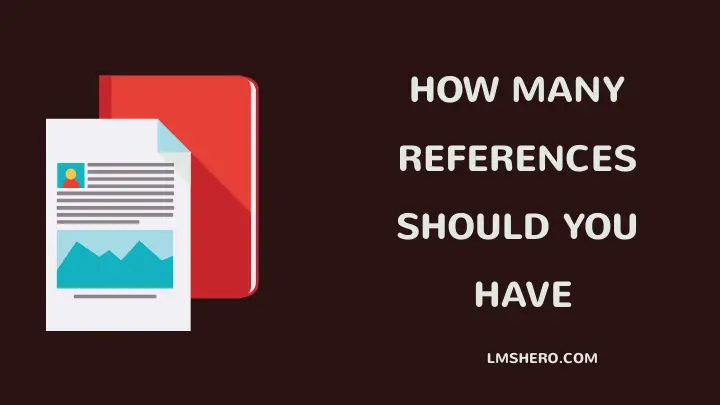Even while references do not get as much attention as resumes and cover letters during the hiring process, a great reference can help you land the job. But the question is, how many references should you have on your resume?
Generally, experts recommend having three to four references for typical job positions, and five to seven for executive-level positions. And it is advised to prioritize your strongest reference.
Learning how to ask people you know for references can help you choose the right references and keep existing relationships with them strong.
In this article, I will explain what a job reference is, how to write a good job reference, and common worries people have while preparing and sending in their reference sheets.
Read on to learn more.
What exactly is a job reference?

A job reference is a professional who tells a potential employer about their experiences working with you. Hiring managers often call people in your network to know more about your past experiences with them
The opinions provided by your references can positively or negatively influence the employer’s final employment choice.
For instance, if you are applying for a position as a teacher in another school, the principal can contact faculty members from your former school to learn more about your teaching style, which could influence your employment.
How many references should you have?
As a job seeker, the minimum number of references you should put on your job application is three. This gives prospective employers multiple opinions and witnesses about your qualifications, work ethic, and character.
While too many references can overwhelm potential employers, too few can make you appear unprepared. However, the number of references necessary may differ based on the position and organization you are applying to.
For example, if you are applying for a senior position at a government agency, the employer may request that you include six or seven references with your application.
However, some hiring managers may not contact all of your references, but giving them multiple options will ensure they speak with someone who can at least attest to your qualifications.
Who you should put in your references
Besides close friends and family members, the best people you should put in your references are people who have a comprehensive knowledge of your work history. The following are people you should consider adding as references:
1. Direct supervisor of a former employer
You can request a reference from the supervisor who evaluated the quality of your work. They can talk about how they managed you as an employee and how well you listened to instructions.
2. Previous coworker
If you want a friend to prove your work performance, you should consider asking a coworker to be your reference. They can talk about how well you communicate with others and deal with workplace issues, which would impress the hiring manager.
3. Teacher
If you have limited work experience, listing a former teacher or college professor as a reference may be advantageous. So, consider approaching a tutor who has taught a course related to the position you are applying for.
4. Advisor
An academic advisor can also speak about your dedication to finishing your studies and your ability to learn new skills. So, you should consider asking your advisor to be your reference if you spent enough time with them while in school.
5. Mentor
Because mentors are generally there throughout your entire career, they can tell how you have improved your skills and professional achievements. They could also be industry experts, making them a good choice for a reference.
How you should prepare your references
To prepare your references, you should inform them beforehand that a potential employer may reach out to them via email or call with questions regarding your job experience so as to be prepared.
Furthermore, they may also contemplate how to describe your relationship with them to the employer. Hence, it is good to prepare your references and reconnect with them, especially if a significant amount of time has gone by since you last worked with them.
For instance, if you are preparing for a managerial role at a different agency, and it has been years since you shared an office with your direct supervisor from your entry-level post.
You can simply send them a message explaining the state of your job hunt and how their review of your credentials can help you secure the desired role.
And while they are familiar with your work style, they may have a productive talk with your potential employer, which could eventually land you the role.
How you should make a reference list
You can list your references in a different document from your resume and cover letter. And don’t forget to start with your best references – the professional with the best knowledge of who you are as an employee.
It could also be someone who has known you the longest or who is closest to your industry contributions. For example, if you’re applying for an entry-level marketing position, your direct supervisor from your time as a marketing intern can be your best reference.
The following are the details regarding your reference to include on your list:
- First and last name
- Job title
- Name of the employer
- Employer’s address
- Email address
- Phone number
- Your relationship with the reference
Tips on how to use references during a job application
The following are what you need when approaching people in your network to be a reference:
1. Maintain strong relationships with professionals in your industry
It is important to keep up strong ties with other professionals in your industry. As this will give you more options when it comes time to list references for a job application.
You should also keep your professional reputation in mind, and how your colleagues regard you as it might boost your confidence that your references would give you a positive recommendation.
2. Tailor your references to specific jobs
Always review your reference list and remove anyone who cannot give information that is directly related to the position you are applying for.
For instance, If you are applying for a position in retail, it would be perfect to add references from your time spent working in retail.
3. Submit references following the employer’s instructions
References can be requested at any point during the hiring process. Hence, you should not list your references except the hiring manager specifically asks for them.
4. Ask your reference how best the employer can contact them
When sending references, the company may want contact information such as their phone number, email address, and email address. So, it is expected of you to ask your reference what details the employer should use to contact them.
5. Send a letter of gratitude
You should send a follow-up letter or email to your references after you have submitted your application for a job. This is a sign of appreciation for their time.
FAQs
Must you include references?
No, references are not required except for your potential employee specifically requested for them in your application.
What information about your references should be avoided?
Any information regarding their race, religion, sex, nationality, weight, financial status, or age is irrelevant.
Conclusion
Generally, if you are interviewing for a role, you could be requested to provide a reference toward the end of the hiring process.
And the potential employer will then call your references and ask them questions about your background and experience to get honest information about your suitability for the position.
Hence, it is important you have a list of references and maintain connections with them so that they can provide you with good recommendations.
Typically, you should have three to five references. However, depending on the role, your employer may need more or fewer, but three is the general number.
I hope you found this article interesting. You can also read to know the reasons why you need a resume for your first job.
Thanks for reading.







